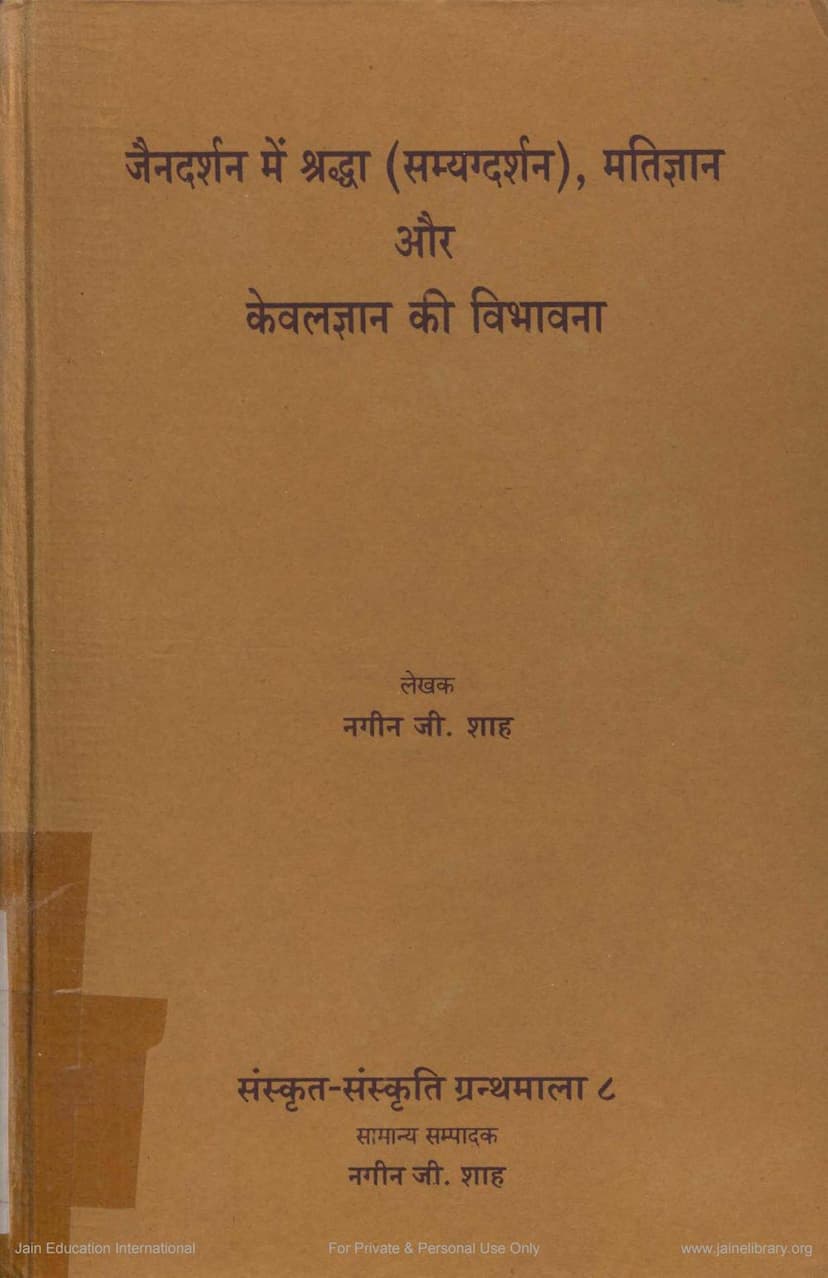Jain Darshan Me Shraddha Matigyan Aur Kevalgyan Ki Vibhavana
Added to library: September 1, 2025

Summary
This document is a comprehensive summary of the Jain text "Jain Darshan me Shraddha Matigyan aur Kevalgyan ki Vibhavana" (A Discourse on Faith (Samyagdarshana), Matijñāna, and Kevalajñāna in Jain Philosophy) by Nagin J. Shah.
The book is presented as part of the Sanskrit-Sanskriti Granthamala series, with Nagin J. Shah serving as the general editor. The author, Nagin J. Shah, is described as a renowned Sanskrit scholar and a significant contributor to the field of Indian philosophy. The book is an English translation of lectures originally delivered in Gujarati.
Core Themes and Structure:
The book is structured around three main lectures, each delving into a fundamental concept within Jain philosophy:
-
Jain Darshan me Shraddha (Samyagdarshana) ki Vibhavana (A Discourse on Faith/Right Faith in Jain Philosophy):
- The author emphasizes the necessity of studying other philosophical traditions (like Upanishadic and Buddhist) to understand Jainism deeply.
- He outlines four spiritual steps found in Upanishadic thought: Darshana (vision/faith), Shravana (listening), Manana (reflection), and Nididhyasana (meditation).
- He argues that "Darshana" in this context is equivalent to "Shraddha" (faith).
- He posits that the Jain concept of Shraddha (Samyagdarshana) is analogous to the third step, Manana (reflection), within the four spiritual stages.
- The book discusses the Buddhist understanding of Shraddha and its various roles.
- It examines the Jain conception of Shraddha and its associated objects: Jiva (soul), Ajiva (non-soul), Asrava (influx of karma), Bandha (bondage), Samvara (cessation of influx), Nirjara (shedding of karma), and Moksha (liberation).
- The author critically analyzes the Jain distinction between Naisargika Shraddha (innate faith) and Adhigamaja Shraddha (acquired faith), suggesting that the former is equivalent to the pre-listening phase of faith (faith as a predisposition) and the latter to the post-listening phase (faith based on scriptures).
-
Jain Darshan me Matijñāna (A Discourse on Matijñāna in Jain Philosophy):
- This lecture connects Matijñāna (sensory and mental cognition) to the spiritual stages, identifying it with Manana (reflection).
- The author explains how Jain thinkers, in constructing their epistemological system (pramanashastra), transformed Manana into Matijñāna, incorporating various forms of cognition like direct perception, memory, recognition, reasoning, and inference into it.
- He highlights the potential historical shift from understanding these as steps of spiritual development to viewing them primarily from an epistemological perspective.
- The book analyzes the classifications of Matijñāna and the reasons for grouping distinct cognitive processes under one category.
- It questions why Shruta (scriptural knowledge) is not included within Matijñāna.
- The author delves into the causes of Matijñāna, including sensory and mental faculties, and discusses the internal inconsistencies and philosophical challenges arising from the Jain classification of knowledge.
-
Jain Darshan me Kevalajñāna (A Discourse on Kevalajñāna in Jain Philosophy):
- This lecture focuses on Kevalajñāna (omniscience), the highest form of knowledge in Jainism.
- The author argues that the concept of omniscience in Jainism, particularly the idea that Kevalajñāna encompasses knowledge of all substances and their infinite modes across all time, leads to an unintended acceptance of absolute determinism (Niyativada). This determinism, he contends, directly contradicts the principles of karma and individual effort central to Jain philosophy.
- He critiques the arguments presented to establish omniscience, finding them logically flawed.
- The text explores the potential implications of equating Kevalajñāna with omniscience, suggesting it might lead to a misunderstanding of Jain teachings and potentially harm the religion's message.
- The author analyzes the meaning of "Kevala" as "pure" or "alone," suggesting that Kevalajñāna is primarily pure knowledge, free from passion (Vitaraagata), and possibly refers to self-knowledge rather than omniscience.
- He discusses how the concept of omniscience was adopted by Jainism, possibly due to external influences and prevailing philosophical trends, and critiques the inconsistencies this adoption creates with core Jain principles like karma and free will.
- The author proposes that Kevalajñāna should be understood as pure knowledge of the self or the principles of Dharma, rather than omniscience about all phenomenal realities.
- He discusses the potential for Jain philosophy to reconcile its concepts by prioritizing the core message of liberation through detachment and self-knowledge over the potentially problematic doctrine of omniscience.
Author's Approach and Contributions:
- Comparative Philosophy: Shah's approach is deeply comparative, drawing parallels and contrasts between Jainism, Upanishadic thought, and Buddhism.
- Critical Analysis: He engages in a critical examination of Jain doctrines, highlighting potential logical inconsistencies and philosophical challenges, particularly concerning the concept of omniscience and its compatibility with the theory of karma.
- Historical Context: The author attempts to trace the evolution of concepts and terminology within Jainism and its relationship with other Indian philosophical traditions.
- Reinterpretation: He suggests alternative interpretations of key Jain concepts, advocating for a focus on the spiritual core of the teachings over potentially problematic dogmatic assertions.
Overall Significance:
The book offers a nuanced and scholarly exploration of fundamental Jain epistemological and spiritual concepts. It encourages a deeper understanding of Jainism through comparative analysis and critical reflection, advocating for a return to the core principles of spiritual liberation. The author's work is praised for its thoroughness, clarity, and insightful contributions to the study of Indian philosophy.